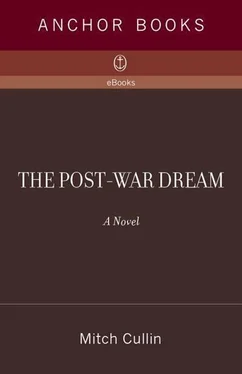“That's nearer than right,” Bill Sr. agreed with a sullen voice, hunched over where he sat and poking at the food on his plate.
What was said about the letters was mystifying, although Hollis could tell Florence wasn't lying. He saw the truth expressed upon her pale white face, heard it in her gentle, mellifluous voice. She had no reason to lie to him, whereas Creed apparently had reason to lie to her and Bill Sr. and Edgar. The best Hollis could figure was that, when writing home, Creed had simply substituted him for Schubert Tang — perhaps because Schubert had been Chinese instead of white, a person who, by last name only, might have sounded more like the enemy than a friend. But even that didn't make much sense. Then after Florence's unlikely revelation came another consideration — a horrible possibility lacking any logic to it, a horrible realization squirming and growing inside his brain — calling into question his memory of Creed, as well as what he believed he had understood for certain about his days serving overseas: Maybe Creed hadn't lied. Maybe, instead, he was the one remembering everything wrong. Maybe everything had happened in slightly different ways and the reality was too awful for him to have sustained, lest he fall apart at the painful recollection of it. Maybe the facts had escaped him on the morning he and Creed were both shot, rattled from him on the banks of the Naktong, ebbing further, then, in the weeks of recuperation, medication, and alcohol. Maybe — maybe — he had been nurturing lies without realizing it, fitting them into the places where he was no longer able or willing to access the truth.
And soon enough Hollis would be asked to dig among those grievous places in his mind, surprising himself with what was lurking there and, as the words slipped easily and dispassionately past his lips, with what he then heard himself say. For Bill Sr. would take him away from the farmhouse, just the two of them jostled inside a red pickup truck, bouncing along a rutted dirt road which wound down and through a valley of craggy, barren mesquite trees. When the truck growled along a steep hill, climbing higher, the ghostly mesquites began decreasing in number until they were gone. With the trees behind them, the truck topped the hill and an expanse of open fields flooded into view. That over there, Bill Sr. went on to mutter while he drove, was for cotton; that one, too; that one up yonder, that's where oats will sprout come spring. Hollis looked to his left, to his right, up ahead, nodding all the while. Keeping his eyes toward the horizon, Bill Sr. stopped the truck in the middle of the road, turning off the engine. Hollis glanced woodenly at him, saying nothing.
For a minute, Bill Sr. continued looking beyond the mud-spattered windshield with his face set. Then wetting his lips, he lowered his head, staring only at the center of the steering wheel. “Son,” he said in the gravest of tones, “I don't like askin’ you this, ‘cuz it's been hard on you, I know, and I ain't sayin’ it ain't been — but you got to tell me something, ‘cuz there's something I need knowing and it couldn't rightly get asked in front of Flo and the boy. So I promise you I won't be badgering you again on this while you're here — or ever again, I promise — but I'm needing to know how it happened that Billy got himself killed exactly. We already know when and where he got hit, we already know that. We know about that damn sumbitch sniper. We know you was there, too, and how you got hit bad in the leg and, son, that's a mighty rotten thing you had done to you — glad you got that sumbitch back, better believe it. But that's about all we got reported to us, and I can't stomach not knowing the whole story, ‘cuz it was my boy who got killed and I've got me a right to know more than just two-bit information on pieces of paper. So I'm hoping you can shed a little more light for me — and I won't ask again, I promise you that — I just need knowing for my own sake, ‘cuz it'd make a world of difference to me, and I'd sure sleep a ton better by knowing.”
The events of five months earlier seemed like they belonged to another lifetime. Still, Hollis would oblige Bill Sr.'s request because, at that moment, it felt as if he had no other choice but to do so. He leaned forward, bringing his stare to the dashboard, saying, “I don't know.” Dust coated everything — the dash, the steering wheel, the seat; unsettled motes of dust floated between and around them like minuscule constellations, as both Hollis and Bill Sr. held their respective gazes within the truck. “I don't know,” he repeated, searching for the proper starting point. “It's not anything I've talked about before.” But already a confident voice he didn't recognize was whispering inside his head, urging him on — some separate part making itself known, speaking to him with an increasing volume and, in due course, speaking from him in a straightforward, deliberate manner.
Then Hollis would talk of that fateful morning at the Naktong; he would relate an account which wasn't entirely familiar to him yet was plausible enough, revising and editing as he went. He and Creed had had a peaceful night at the two-man listening post. Pressing their shoulders against sandbags, they had swapped cigarettes at dusk and talked in low voices about insignificant things, the way friends tend to do — people they missed back home in the States, food they looked forward to eating again, mostly small talk Hollis couldn't now begin to recall. With darkness their conversation had drifted toward silence, both holding positions on either side of the post, monitoring the night, entranced by the purring of crickets and the steady burbling of the river. A few times they had heard rustling in the nearby wild grass and reeds, but it always proved to be nothing more than the invisible hand of nature. By first light the air had become cooler and smelled sweeter than it had throughout the uneventful night. In the calm morning the crickets grew quieter, and the hillsides were turning green and golden. It was almost time for them to leave, to return to camp on a trail which ran along the edge of an apple orchard. Beside a dying pine tree at the rear of the listening post, he and Creed had stood up to urinate, putting the trunk of the tree between themselves and the river, half shielding their bodies there. But no sooner had they unfastened their pants when Creed saw something glinting beyond Hollis, several yards away in the reeds and reflected by sunlight. Perhaps, at that moment, Creed had shouted a warning, although Hollis couldn't say for certain. However, he remembered Creed pushing him violently aside at the very instant a loud crack erupted within the reeds, and he remembered looking up from the ground as Creed staggered back into the trunk, bleeding at his neck. After that, Hollis told Bill Sr., his mind was a jumble, a mess of black spaces and frozen seconds. Of course, later on, what had then transpired was pieced together and made plain: he had pursued the sniper on the banks of the river, had chased the gook bastard and killed him — but not before also getting shot, not before feeling the same burning sting which had taken Bill McCreedy Jr. from the world.
“He saved my life,” Hollis said miserably, “and I couldn't save him. Everyone said I'd been a hero, even though it's not anything I'm proud of. The real hero was your son, sir, and I can't stand how I'm here now and he isn't, doesn't seem right some way. What keeps me going is not letting myself forget I owe the rest of my days to him. So I've got a duty to keep my head above water and let my life from here on out serve as an honor to his memory — and that's what I'm intending to do, that's pretty much all I can tell you, sir.”
Bill Sr. raised his head. He brought his stare to the driver window, lost in thought. After a while he said, “I appreciate it, son,” sounding as if the wind had been knocked from him.
Читать дальше










![Theresa Cheung - The Dream Dictionary from A to Z [Revised edition] - The Ultimate A–Z to Interpret the Secrets of Your Dreams](/books/692092/theresa-cheung-the-dream-dictionary-from-a-to-z-r-thumb.webp)

